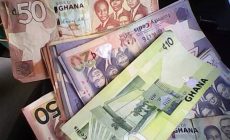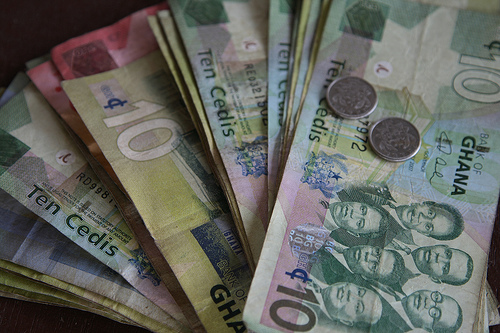Ghana Cedi down by 12.5%
- Posted on
- Comment
 WITH barely few days to end the first quarter of 2015, the Ghana Cedi has been ranked the second worst performing currency in the African continent, continuing what it left last year.
WITH barely few days to end the first quarter of 2015, the Ghana Cedi has been ranked the second worst performing currency in the African continent, continuing what it left last year.
According to renowned research institution, Ecobank Research, a subsidiary of Ecobank Transnational Incorporated, the local currency has depreciated by about 12.6 per cent to the American dollar since the beginning of this year despite beginning the year at GH¢3.20 to the dollar.
This is out of 25 African currencies surveyed by the research outfit based in London and made available on March 23. Some of the currencies captured included the South African Rand which has witnessed a better performance so far this year declining by 3.9 per cent, The Gambian Dalasi losing only 0.3 percent value to the dollar, Liberian Dollar and Kenyan Shilling.
Last week alone, the Cedi went down by 3.6 per cent to the American currency. It had depreciated by almost 32 per cent last year against the green currency, making it joint worst currency with the Zambian Kwacha in the continent.
The Zambian Kwacha is however the worst performing currency in Africa and is expected to end the first three months of this year with about 17 percent decline to the US Dollar.
Interestingly, neighboring Nigeria which is expected to witness sharp decline in its exports revenue this year because of huge fall in the price of crude oil has seen its currency the Naira declining by 7.3 percent to the US Dollar. The Ivory Coast CFA has also been hit hard, going down by 10.7 percent to the US Dollar as at the end of March 20.
As at March 24, 2015, some forex bureau operators in Accra were selling one US Dollar for GH¢3.72. On the interbank market, however, the local currency is going for GH¢3.68 against the American currency.
With regard to the outlook, Ecobank Research is projecting GH¢3.79 to the US Dollar by the end of March.
Its assertion is driven by ongoing, strong import demand despite the International Monetary Fund reform programme expected to be confirmed by the Executive Board in April. Others are sustained strong US dollar demand to meet import bills, and large and unsustainable fiscal and current account deficits which continue to undermine the Cedi, high and accelerating inflation (16.5 percent in February 2015) and move towards dollarization which add further pressure on to the Cedi.
It however explained that the IMF advised reforms will help build confidence but the challenge for the authorities is to implement tough reforms that will create environment of austerity.
Some analysts are anticipating further depreciation of the Cedi if the economic fundamentals are not improved. The economy has been hit hard by large borrowing by government vis-a-vis high interest payments, a weaker balance of payment among others.
Already, the Bulk Oil Distributors are warning of a likely adjustment in fuel prices because of the exchange rate margin the depreciation of the Cedi posses.
Ratings agency, Fitch on Monday kept Ghana’ sovereign rating at B with a negative outlook warned of the high interest payments and added with 55 per cent of the debt stock denominated in foreign currency, this external vulnerability could be quickly transmitted to the public finances and affect the local currency.
-Finder










 (Selorm) |
(Selorm) |  (Nana Kwesi)
(Nana Kwesi)